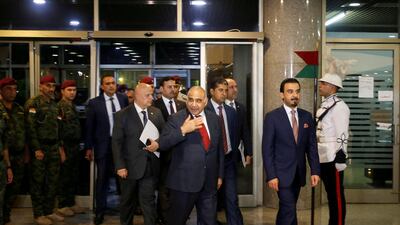Iraq's Prime Minister Adel Abdul Mahdi formed a new government on Thursday, five months after a nationwide parliamentary election, but critics say the presence of militia-affiliated politicians in the cabinet suggests he fell short of promises to run a technocratic government stocked with fresh faces.
Mr Abdul Mahdi was sworn in as prime minister of Iraq after parliament accepted 14 out of his 22 nominations, giving him enough ministers to convene his government.
"Parliament has made great effort to form the new government within the constitutional time frame to fulfill its commitments in approving a new cabinet, the 14 ministers were sworn in," Mohammed Al Halbousi, parliamentary speaker said.
But key posts such as ministers of defence, justice, and interior are yet to be agreed on.
Mr Abdul Mahdi had earlier promised to install a government of technocrats to reform the country's ailing public sector.
Only 220 lawmakers attended the session, leaving more than 100 seats empty in the 329-seat body.
Among the 14 ministers who were sworn in, Thamer Ghadhban became oil minister and veteran Kurdish politician Fuad Hussein finance minister.
Mr Ghadhban replaced Jabar Al Luaibi, who was recently made head of the new National Oil Company. He helped resuscitate a flagging oil industry after the 2003 US-led invasion of Iraq that toppled former dictator Saddam Hussein.
He was interim oil minister from 2004-5 and a former energy adviser to the former prime minister Haider Al Abadi.
The new electricity minister, Luay Al Khateeb, is the executive director of an energy policy institute, the Iraq Energy Institute.
Mohammed Al Hakim became the new foreign minister, after earlier serving as Iraq's permanent representative to the United Nations.
None of the appointments were known to have come from an online application portal launched by Mr Abdul Mahdi to bring new faces into government. His office received over 15,000 applications in less than a week after the website went live earlier this month.
The average known age of the the 22 nominated ministers is 53-years-old.
The youngest Asma Al Kaldani, who is 35, was nominated for the post of justice minister. Mr Ghadhban, the new oil minister, is the oldest at 73.
Eight ministerial nominations were vetoed by lawmakers from populist cleric Moqtada Al Sadr’s bloc Saeroon, former prime minister Haider Al Abadi’s Nasr Alliance, outgoing Vice President Ayad Allawi’s Wataniya party, and various Sunni Muslim blocs, who all left the chamber before voting could take place.
“We decided to withdraw from the session, because we are not satisfied with the rest of the cabinet candidates,” said Nasr lawmaker Ali Sined.
Earlier Mr Abdul Mahdi had vowed to appoint a cabinet of politicians free of conflicts of duty and ties to militias. But some of his nominations suggested that powerful militias retains influence to propose ministers.
Mr Abdul Mahdi's nomination for interior ministry, Falih Al Fayadh, was formerly chairman of the Popular Mobilisation Forces, an umbrella group of militias, many of which are close to Iran.
Lawmaker Mushriq Al Naji said the walk out was over the nomination of ministers with prior records of disappointing performance of government.
"Falih Al Fayadh lacks experience, he has made no achievements is considered unsuccessful by many lawmakers," Mr Al Naji said.
_______________
Read more:
Iraqi MPs debate late into the night proposed cabinet nominees
Tens of thousands seek posts in Iraqi cabinet
Iraq PM designate Adel Abdul Mahdi met with cautious optimism
Iraq offers citizens opportunity to apply online for cabinet positions
_______________
The nominations for justice, culture and education ministers were also disputed.
Iraq is consistently ranked among the most corrupt states, and frustration over chronic power cuts and water pollution sparked riots in the south this summer.
The prime minister is a former vice president who has previously served as ministers of oil and finance.
The vote on the remaining ministries will be held by Mr Abdul Mahdi on November 6.
__________________
Get stories like this on in your inbox each morning. Sign up for our daily newsletter here

